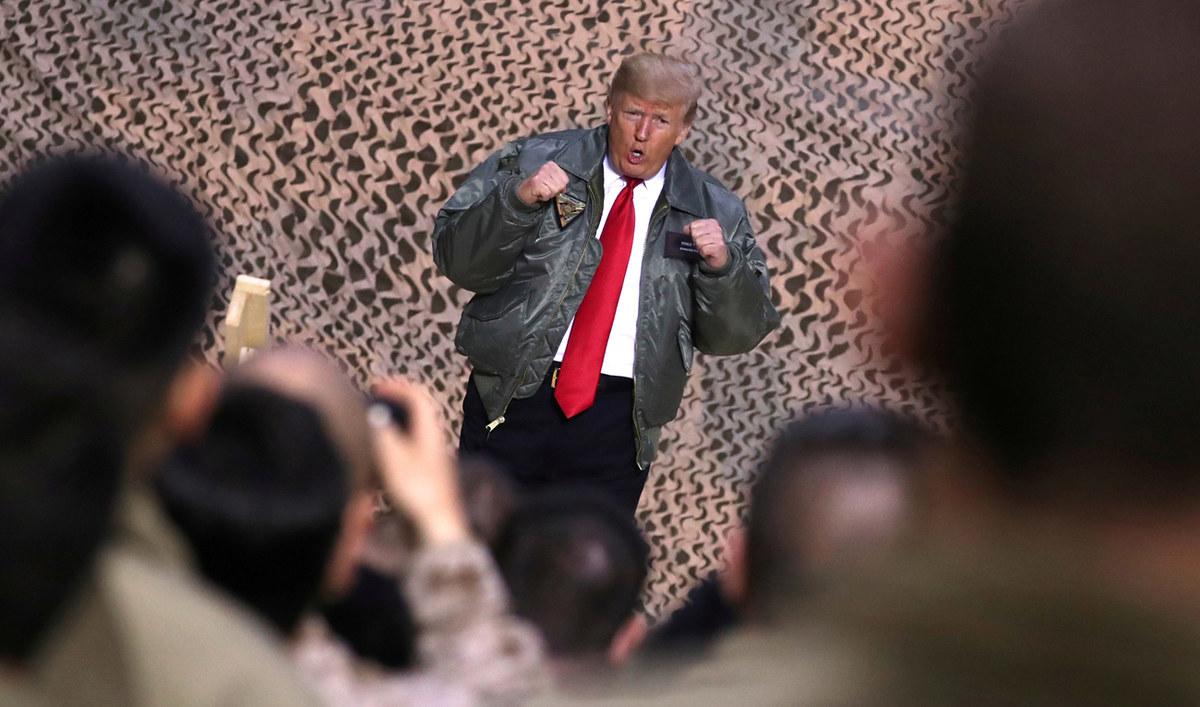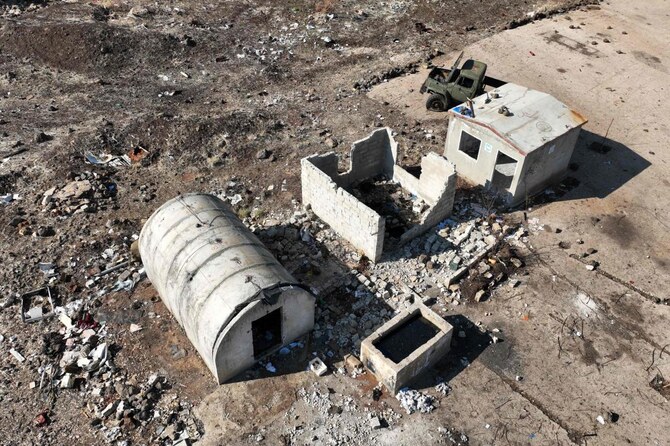TEHRAN, Iran: The Iraqi military on Wednesday said there were no casualties among its troops as a result of an Iranian missile strike at bases in Iraq used by US forces.
The military said in a statement carried by the state news agency that the attack lasted half an hour, starting at 1:45am local time.
The statement said 22 missiles were fired. Seventeen missiles hit Al-Asad air base, including two that did not explode in the Hitan area west of the town of Hit. Five other missiles hit the northern region of Erbil.
State new agency KUNA earlier reported Kuwaiti Defense Minister Ahmad Mansour Al-Ahmad Al-Sabah has received an official letter from the commander-in-chief of Camp Arifjan declaring imminent withdrawal of all US military forces in three days.
The receipt of letter from Camp Arifjan was unexpected, Kuwait defense minister was quoted as saying, and they were communicating with the US Department of Defense for more details and information.
The statement was later removed, with KUNA saying their Twitter account was hacked.
Iran struck back at the United States on Wednesday for the killing of Revolutionary Guard General Qassem Soleimani, in a major escalation that brought the two longtime foes closer to war.
A US official said there were no immediate reports of American casualties, but buildings were being searched.
An adviser to the Iranian President Hassan Rouhani tweeted saying any adverse military actions by the US would be met with all-out war in the region.
And a senior official in the Iranian supreme leader’s office said the missile attacks against the US targets were the weakest of Iran’s retaliation scenarios.
Iraqi Prime Minister Adel Abdul-Mahdi called on all sides to practice self-restraint, adhere to international agreements, and respect Iraqi state. This dangerous crisis threatens a “devastating all-out war” in Iraq, the region, and the world, he added.
Germany’s defense minister condemned the missile attacks, and called on Tehran to end a “spiral” of conflict.
“The German government strongly condemns this aggression ... it is now primarily up to the Iranians to refrain from further escalation,” Annegret Kramp-Karrenbauer told broadcaster ARD.
UK Foreign Secretary Dominic Raab also condemned the attacks on ‘Iraqi military bases hosting Coalition – including British – forces.’
“We are concerned by reports of casualties and use of ballistic missiles. We urge Iran not to repeat these reckless and dangerous attacks, and instead to pursue urgent de-escalation,” Raab said.
The Iranian army repeated earlier demands for the US to withdraw its troops from the Middle East, state TV reported.
“Now that they have understood our power, it is time for the United States to withdraw its troops from the Middle East,” Iran’s armed forces chief of staff General Mohammad Baqeri said in a statement.
A top commander in Iraq’s Hashed Al-Shaabi paramilitary network said Wednesday it was time for an ‘Iraqi response’ to a US drone strike that killed the network’s deputy chief Abu Mahdi al-Muhandis.
“That response will be no less than the size of the Iranian response. That is a promise,” Qais Al-Khazali, a hardline Hashed commander, threatened in a tweet.
UAE Energy Minister Suhail Mohamed Al Mazrouei, meanwhile, said he was not expecting to see a war, and did not think the US wanted to become more aggressive in the Middle East. He allayed fears of a possible shortage of oil supply, adding that OPEC would respond if necessary but ‘we have limitations as well’ to replace possible oil shortages.
President Donald Trump said he would make a statement on the situation on Wednesday morning.
‘All is well!’ Trump said in a post on Twitter.
Soleimani’s killing and the strikes by Iran came as tensions continued to rise across the Middle East after Trump’s decision to unilaterally withdraw America from Tehran’s nuclear deal with world powers.
They also marked the first time in recent years that Washington and Tehran have attacked each other directly rather than through proxies in the region. It raised the chances of open conflict erupting between the two enemies, which have been at odds since Iran’s 1979 Islamic Revolution.
Iran’s Supreme Leader Ayatollah Ali Khamenei said on Wednesday the US should withdraw from the region and said Tehran’s missile attacks on US targets in Iraq were “a slap on the face” for America.
“Military action like this is not sufficient. What is important is ending the corrupting presence of America in the region,” Khamenei said in a televised speech, ruling out any resumption of talks with Washington about a 2015 nuclear deal.
The US Federal Aviation Administration said it would ban US carriers from operating in the airspace over Iraq, Iran, the Gulf of Oman. Several foreign airlines also said they would also avoid flying over the affected areas.
Iran initially announced only one strike, but US officials confirmed both. US defense officials were at the White House, likely to discuss options with Trump, who launched the strike on Soleimani while facing an upcoming impeachment trial in the Senate.
Iran’s Revolutionary Guard warned the US and its regional allies against retaliating over the missile attack against the Ain Al-Asad air base in Iraq’s western Anbar province. The Guard issued the warning via a statement carried by Iran’s state-run IRNA news agency.
“We are warning all American allies, who gave their bases to its terrorist army, that any territory that is the starting point of aggressive acts against Iran will be targeted,” The Guard said. It also threatened Israel.
After the strikes, a former Iranian nuclear negotiator posted a picture of the Islamic Republic’s flag on Twitter, appearing to mimic Trump who posted an American flag following the killing of Soleimani and others Friday in a drone strike in Baghdad.
Iran is not seeking escalation or war, Iranian Foreign Minister tweeted after Tehran hit US targets in Iraq on Wednesday, adding that Tehran would defend itself against any aggression.
“Iran took & concluded proportionate measures in self-defense under Article 51 of UN Charter targeting base from which cowardly armed attack against our citizens & senior officials were launched. We do not seek escalation or war, but will defend ourselves against any aggression,” Mohammad Javad Zarif tweeted.
Ain Al-Asad air base was first used by American forces after the 2003 US-led invasion that toppled dictator Saddam Hussein, and later saw American troops stationed there amid the fight against Daesh in Iraq and Syria. It houses approximately 1,500 US and coalition forces.
Two Iraqi security officials said at least one of the missiles appeared to have struck a plane at the base, setting it on fire. It was not immediately clear whether it was an Iraqi or US jet. There were no immediate reports of casualties from the attacks, according to the officials, who spoke on condition of anonymity as they had no permission to brief journalists.
About 70 Norwegian troops also were on the air base but no injuries were reported, Brynjar Stordal, a spokesperson for the Norwegian Armed Forces told The Associated Press.
Meanwhile, New Zealand’s acting Prime Minister Winston Peters said personnel in Iraq are as safe as they can be in the developing circumstances.

Trump visited the same base in 2018. (Reuters)
Trump visited the sprawling Ain Al-Asad air base, about 100 miles or 60 kilometers west of Baghdad, in December 2018, making his first presidential visit to troops in the region. He did not meet with any Iraqi officials at the time, and his visit inflamed sensitivities about the continued presence of US forces in Iraq. Vice President Mike Pence also has visited the base.
Iranian state TV said the Guard’s aerospace division that controls Iran’s missile program launched the attack, which it said was part of an operation dubbed “Martyr Soleimani.” Iran said it would release more information later.
The US also acknowledged another missile attack on a base in Irbil in Iraq’s semiautonomous Kurdish region.
“As we evaluate the situation and our response, we will take all necessary measures to protect and defend US personnel, partners and allies in the region,” said Jonathan Hoffman, an assistant to the US defense secretary.
The US blames Soleimani for killing US troops in Iraq and accused him of plotting new attacks just before he was killed. Soleimani also led forces supporting Syrian President Bashar Assad in that country’s civil war, and he also served as the point man for Iranian proxies in countries like Iraq, Lebanon and Yemen. Russian President Vladimir Putin met with Assad in Syria on Tuesday amid the tensions between Washington and Tehran.
Soleimani’s slaying already has led Tehran to abandon the remaining limits of its 2015 nuclear deal with world powers as his successor and others vow to take revenge.
In Iraq, pro-Iranian factions in parliament have pushed to oust American troops from Iraqi soil following Soleimani’s killing. Germany and Canada announced plans to move some of their soldiers in Iraq to neighboring countries.
The US Navy’s Bahrain-based 5th Fleet said it would work with shippers in the region to minimize any possible threat.
The 5th Fleet “has and will continue to provide advice to merchant shipping as appropriate regarding recommended security precautions in light of the heightened tensions and threats in the region,” 5th Fleet spokesman Cmdr. Joshua Frey told The Associated Press.
Iran’s parliament, meanwhile, has passed an urgent bill declaring the US military’s command at the Pentagon and those acting on its behalf in Soleimani’s killing as “terrorists,” subject to Iranian sanctions. The measure appears to be in response to a decision by Trump in April to declare the Revolutionary Guard a “terrorist organization.”
The US Defense Department used that terror designation to support the strike that killed Soleimani.




























